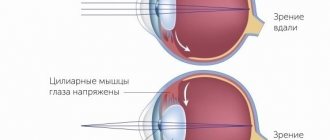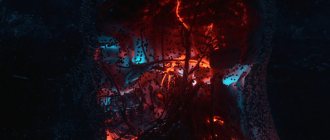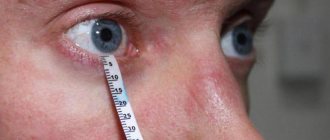During our lives, many of us have encountered the fact that we have already seen some new object or event before. Or, being in a new place for the first time, there was a feeling that we had already visited it. But we couldn’t remember other circumstances, no matter how hard we tried to do so. This phenomenon is referred to by scientists as deja vu. This is what we will talk about in this article. What is déjà vu and how it happens will be discussed further.
Let's look at what deja vu is
What is deja vu from a scientific point of view?
In reality, only a small number of people are interested in this phenomenon from a scientific point of view. Therefore, let’s consider what déjà vu is as a phenomenon.
The word “déjà vu” comes from the French “déjà vu”, which in translation means “already, previously seen”.
The first mention and use of the term we are considering dates back to the 19th century. The term "déjà vu" was coined by the French psychologist Emile Boirac. E. Boirac used the term in his book “Psychology of the Future”, meaning by it some violation of a person’s perception of the reality around him. At the same time, a person feels the unreality of what is happening, sometimes mystery and even mysticism.
However, the Large Modern Explanatory Dictionary calls the definition of déjà vu a mental disorder, which is a feeling in which current events are repeated and take place in the past.
Later, English psychiatrist H. J. Jackson conducted research on déjà vu as an accompanying symptom of epilepsy. He compiled one of the first descriptions of the phenomenon from a scientific point of view. While studying and treating epileptic seizures, the scientist noted in his works the fact that any healthy person experiences the effect of déjà vu only a few times throughout his life. While people with epilepsy may experience it much more often, at least before each attack.
The term "déjà vu" appeared as a result of the treatment of mental illness
Controversies and discussions continue to flare up around the phenomenon of déjà vu to this day. That is why we have not yet come to a unified concept of the phenomenon. The fact is that a number of scientists from one group associate it with human memories, others with brain activity, and still others with fantasies and dreams. For a long time, the impossibility of tracking and the spontaneity of déjà vu did not allow us to study this phenomenon. However, modern scientists, thanks to technology, have been able to study it. During experiments, experts determined that déjà vu is accompanied by the simultaneous activation of several areas of the brain that are responsible for sensory perception and long-term memory. The impulse emanating from the collision of these zones gives a “false signal”, which is why a person perceives what is happening in reality as a memory. So, in a sense, déjà vu is a memory error.
Ultimately, what is déjà vu? The easiest way is to say in your own words what deja vu is. The phenomenon of deja vu means a state of a person in which new events are perceived as a past moment in life.
In science, déjà vu is associated with the presence of a false signal that occurs in the human brain
Deja vu theories
10. Mixing feelings and memory
This hypothesis attempts to explain the feeling of déjà vu by relating it to our sensory perceptions. A famous psychology experiment, Grant et al's study, shows that our memory is context dependent, meaning that we can remember information better when we place it in the same environment in which we learned it.
This helps explain déjà vu by showing how stimuli in the environment can trigger certain memories. Some landscapes or smells can push our subconscious to pull out from memory those periods of time when we have already experienced it.
With this explanation, it is also clear why the same déjà vu sometimes repeats. When we remember something, it increases the activity of our neural pathways, meaning we are more likely to remember something we think about frequently.
However, this theory does not provide an explanation as to why déjà vu occurs in the absence of familiar stimuli.
9. Double processing
Like the previous theory, this hypothesis is also associated with improper memory functioning. When we initially receive some information, our brain places it into our short-term memory.
If we return to this information, revise it, supplement it, it will ultimately be transferred to long-term memory, because it is easier to retrieve it from there.
Reasons for deja vu
Since the phenomenon in question remains the subject of much debate and research to this day, and you already know what déjà vu is from a scientific point of view, it’s time to understand the reasons for its occurrence. Scientists in the course of neurophysiological studies suggest that the following aspects can influence the occurrence of the déjà vu effect:
- Staying in stressful situations;
- Physical condition of the human body;
- Level of intelligence (the appearance of déjà vu is influenced by high intelligence);
- Mental disorders, human deviations;
- Personal intuitive abilities (a person’s ability to understand something without conscious reasoning - “intuitively”);
- Injuries (For example, traumatic brain injuries often cause the phenomenon of déjà vu. The left hemisphere is responsible for memory, the right for events of the past. Thus, if either of them is damaged, memories or perception of reality may be lost).
There are a large number of reasons for the phenomenon, but we will consider only a few of them.
There are many reasons for the occurrence of the déjà vu effect
Layering of impressions
A person’s life is permeated with impressions of a completely different nature, both pleasant and not entirely pleasant. It happens that within a short time, for example, one day, a large number of events occur. And accordingly, from each of them we experience certain impressions. When it’s time to go to bed, you can’t fall asleep due to an overabundance of emotions. This is also a certain stress for the body, the impressions are layered. And our brain tries to forget events, for example unpleasant ones, and this is how the déjà vu effect occurs.
Scientists conducted an experiment in which subjects were shown cards with various data, drawings, and so on. Then, using hypnosis, they were forced to forget what they saw and after that they were shown them again. The second time, the brain reacted as if the subject was experiencing the effect of déjà vu.
Jokes of the subconscious
The operating principles of our subconscious are very difficult to understand. That's why it sometimes plays its games with us. They are also classified as a person’s intuitive abilities, when the brain offers possible options for events so quickly that there is no time left for rational thinking. For example, when the parents of a child, knowing his character and clumsiness, seem to predict future events. For example, when they say “don’t run so fast, you’ll fall,” and at the same moment the child stumbles and falls, not having time to “digest” the parent’s instruction.
Mysterious dreams
Dreams can also cause this mysterious effect. As a rule, people do not remember the dreams they have had. Or they remember, but remember them for a very short time. In a dream, people can see locations, people, and so on that are very similar to those existing in reality. Thus, having encountered a similar picture in life, a person experiences deja vu, an event similar to his dream.
A picture seen in a dream often causes deja vu
Right to reincarnation
In addition to other reasons, reincarnation (relocation of the soul after death) takes place in the study of such a mystical phenomenon. Sigmund Freud explained déjà vu as the memory of ancestors.
Reincarnation from Latin means “reincarnation”, in other words, the rebirth of the soul.
Parapsychology studies the possibility of soul rebirth. A considerable number of cases are known, most often among children who remember their “former life”, suddenly speak other languages and reproduce facts, even if they did not know about them and could not have known at that moment. Thus, reincarnation and déjà vu intersect when events from a past life occur in the present.
Showing emotions
The next reason is the manifestation of emotions. Or to be more precise, layering them. The mechanism is very similar to the layering of impressions. At some point, the human brain cannot cope with the delimitation of time. At this moment, he takes emotions from the past and mixes, layers them on the emotions experienced at the present moment. As a result of this confusion, déjà vu occurs.
Extreme fatigue
The state of the body greatly affects a person’s brain activity. If the body is weakened, a person feels very tired - all this is a great stress for him. The result is that the body cannot cope with it, and the brain does not have time to process the incoming information.
Good vacation
A good or too good rest can also lead to a deja vu effect. In those moments when the brain is not overloaded, a person feels too relaxed - all processes accelerate, including brain impulses.
Good rest leads to relaxation of the brain, which leads to the emergence of the effect of already experienced memories.
Why does the deja vu effect occur?
Many specialists are studying the reasons why déjà vu occurs: psychologists, parapsychologists, biologists and physiologists, and those who practice occult science. Modern scientific research interprets the occurrence of “false memories” - déjà vu, in the temporal part of the brain called the hippocam, which simultaneously records and analyzes perceived information in the brain.
Disturbances in the functioning of the hippocam, for a few seconds, lead to the entry of information into the memory center without preliminary analysis, but the failure after a short period of time - a fraction of a second - is restored, and the received information is processed again, perceived as “previously seen” - false memories are formed. A person may feel a loss of reality; current events may seem unnatural and unreal.
Types of deja vu
Earlier, we already discussed what déjà vu is, however, this phenomenon is expressed in several types, which you will now become familiar with.
- Dejà vecu (“Dejà vecu” - already, previously experienced). This variety differs from déjà vu in that the memory of what previously happened is more perceptible. A person feels not just that he has already “seen this somewhere”, but distinguishes smells and various accompanying sounds. At such moments, a person seems to be sure of what will happen next.
- Deja visite (“Deja visite” - already, previously visited). The feeling of this type of déjà vu is accompanied by a person’s confidence that he knows the necessary route when he is in a new place, city, although he has never been there before and has not even looked at, for example, photos or maps.
- Deja senti (“Deja senti” - already, previously felt). This type concerns a person’s senses, most often the hearing organs. With déjà senti, a person experiences that he is already familiar with a new sound or voice.
- Jamevu (“Jamais vu” - the opposite). Jamevu is the opposite of deja vu. People most often experience it when they feel very tired. A person may not recognize a place he has already been to or people he has already seen. This type is in no way associated with memory problems, as it is characterized by suddenness, short duration and infrequent manifestations. The jamevu effect was proven through an experiment where people were asked to write one word (house, door, apple) 30 times in 1 minute. At the end of the test, about 70% of people began to doubt the reality of the word.
- Presquevue (“Presque” - almost seen). Almost every person has encountered this interesting species. That very moment when, during a speech, you suddenly forget a word, even if it is the simplest, and you use it quite often in your speech.
- The Staircase Mind (“L'esprit de l'Escalier”). A phenomenon in which a person finds an answer or remembers a thought that he wanted to say earlier only at the moment when they are no longer needed. Literally – I remembered when I had already left the room.
Science identifies a large number of types of déjà vu
What is it: definition of the term
What does the word deja vu mean? Translated from French, the phenomenon means “already seen . It is not surprising that many people compare this state to watching a movie that they have already seen.
They have separate images, but there is no information in their memory about how events will develop further. It is especially surprising when, when seeing an unfamiliar face or visiting a new place, you can describe this person or situation in detail.
It is impossible to remember at what point these events occurred . However, there is a clear confidence that you know the sequence of development of the situation. When a situation occurs, a person notices that everything happened exactly as it should have.
Doctors say the following about this effect: in their opinion, it is a mental state when the patient feels that he has already been in such a situation or place. But the feeling is not associated with any moment in the past.
There are 3 forms of the condition:
- Deja century (“already lived”): the events in which a person finds himself seem familiar.
- Deja senti (“already experienced”): as if the feelings he experienced had already happened before.
- Deja visit (“already visited”): a person is sure that he has already been to a specific place before.
Interesting facts about deja vu - in the video:
Theories of the appearance of déjà vu
Even taking into account the large number of studies on the phenomenon of déjà vu, a clear answer about its nature has still not been received. On the one hand, due to the fact that the phenomenon has not been studied, a large number of theories of different nature appear. On the other hand, the diversity in theories and views makes it difficult to determine the true nature of the phenomenon. Next, you will learn about these theories and, perhaps, you will find exactly the one whose essence will become closer and clearer to you.
Glitch theory
This is probably the most unusual theory for the origin of déjà vu. The author of the glitch theory is Albert Einstein. The hypothesis is based on the assumption that time does not exist as such. It was simply invented by people in order to explain the change of day and night, to establish order, a daily routine. And since time, as a kind of illusion, does not exist, then “falling out of reality” through the feeling of deja vu helps a person get rid of this illusion. No evidence has been found for the glitch theory, so it remains only a hypothesis.
Reincarnation
We have already talked about reincarnation earlier. The theory that souls are reborn, and therefore people remember some moments from a past life, was supported by the ancient philosophers Plato and Pythagoras. They claimed that from time to time they remembered events from a past life. The theory of reincarnation is quite popular. The author of the theory is a hypnotherapist - Dolores Cannon. She obtained historical information by placing her patients in a hypnotic trance. An interesting fact regarding this theory is that the Swiss psychiatrist and philosopher Carl Gustav Jung recalled that he once saw a figurine of a doctor while visiting. This figurine was unfamiliar to him, but he recognized the shoes on it - according to him, in a past life he wore the same ones, so he was sure that in a past life he was a doctor.
Reincarnation, although not scientifically proven, can cause déjà vu
Amygdala
The amygdala (amygdala) is the most unstudied part of the brain, which is responsible for a person’s experience of emotions. It is in this area of the brain that an impulse in the form of panic or fear arises. The amygdala theory of déjà vu is that déjà vu is caused by stress.
Divided attention or self-remembering
The theory of divided attention or self-remembering is explained by the conflict between the subconscious and consciousness. In simple words, according to this theory, déjà vu occurs when the subconscious mind accepts an event, emotion or object, and the conscious mind denies it. This theory was proven through experiment. A number of people were shown photographs of certain places, some the subjects had visited before, and others completely unfamiliar to them. The point is that the photographs were shown very quickly, memorization occurred only subconsciously. As a result of this experiment, subjects marked unknown places as those they had been to.
Prophetic dreams
The theory of prophetic dreams is based on the existence of a sixth sense, which arises exclusively in the human subconscious. When a person finds himself in a familiar situation, perhaps he has already dreamed of something similar and remembered it on a subconscious level.
Prophetic dreams are a very common phenomenon.
Hologram theory
The hologram theory was put forward by Hermon Sno. He represented the memorization process as a system of connections. This system of connections consists of a chain of three-dimensional images. Thus, any incoming information is divided into these elements, and when one of them is remembered, the general structure is restored in the human mind, in other words, the puzzle is put together. Just like the process of reproducing a hologram, the entire chain is reproduced only with the help of subconscious memory, but consciousness is not able to accept it.
Recognition memory
Recognition memory in the matter of déjà vu is familiar to a large number of people. This theory is confirmed by the fact that when we meet a stranger, he seems familiar to us. Recognition memory also works in situations where we are looking for the desired number among contacts or during a police identification parade. The action of recognition memory occurs on the principle of comparison and identification of an object in reality with those that are preserved in human memory. However, it is not possible to accurately reproduce the required object, although general features are captured. To confirm the theory of recognition memory, an experiment was conducted in which a group of people were given a list with the names of famous and famous people, after which they were shown photographs of them. Some photographs showed people whose names were not on the list, but the subjects identified them as people from the list provided at the beginning.
Parallel universe theory
The hypothesis about the existence of a parallel universe or many parallel worlds is the most fantastic of all existing ones. Its supporters are of the opinion that at the moment of any action or situation when a person experiences the effect of déjà vu, this may mean that his “I” from a parallel world performs the same action or feels the same emotions at the same time. The theory of a parallel universe is so fantastic that finding confirmation of it turned out to be an impossible task for our world. However, this does not reduce the number of its adherents and supporters.
The possibility of the existence of parallel universes is still being studied by physicists
Double process
The dual process theory is based on failures occurring in brain activity, or rather memory failures. These failures occur when received information moves from short-term memory to long-term memory. Due to the failure that occurs, information is not removed from short-term memory, so doubling of the same information occurs in different channels. The validity of the dual process theory has not yet found explanations or evidence.
A mixture of feelings and memories
Given that our brains are better at remembering systems and related elements, the theory based on a mixture of feelings and memories is the most common among researchers on the issue of déjà vu. Its essence lies in the fact that a person remembers an object in conjunction with the surrounding environment, for example. The emergence of a certain memory, be it a smell, an emotion or a feeling, pulls with it other memories from the overall picture. However, they appear to a person unconsciously and he fails to focus his attention on this.
Have you ever had a feeling of déjà vu?
Yes, I had a feeling of déjà vu
100%
No, I haven't experienced that
0%
Voted: 9
What do scientists think about the déjà vu effect?
Where do childhood memories go? Why is our brain able to forget? Can you trust fragments of memory? The problem of childhood memories has been worrying scientists for many years, and recent research by psychologists and neurophysiologists can clarify a lot in these issues.
My memories are like gold in a purse given by the devil:
you open it, and there are dry leaves.
Jean-Paul Sartre
Childhood. River. Shimmering water. White sand. Dad teaches me to swim. Or here’s another: treasures. You will collect all sorts of junk such as beads, colored pieces of glass, candy wrappers and chewing gum, dig a small hole in the ground, throw your treasures there, press it all down with previously found bottle glass and cover it with earthen soil. Nobody ever found them later, but we loved making these treasure chests. My memory from kindergarten is reduced to these individual moments: drawing with my finger on the foggy glass of a window, my brother’s plaid shirt, a dark winter street dotted with red lights, electric cars in the children’s park.
When we try to remember our life before the moment of birth, we only see such glimpses in the memory closet, despite the fact that we thought about something then, felt something and learned a lot about the world in those days. Where did all those childhood memories, those years go?
© Gerard DuBois
The problem of childhood memories and inevitable forgetting fits into a simple definition by psychologists - “childhood amnesia.” On average, people's memories reach the age when they were 3-3.5 years old, and everything that happened before that becomes a dark abyss. Leading expert on memory development from Emory University, Dr. Patricia Bauer, notes:
This phenomenon demands our attention because it contains a paradox: many children perfectly remember the events of their lives, but as adults, they retain a small part of their memories.
In the last few years, scientists have been particularly focused on this question and seem to have managed to unravel what happens in the brain when we lose memories of our earliest years.
And it all started with Freud, who back in 1899 coined the term “infantile amnesia” for the described phenomenon. He argued that adults forgot their early years of life in the process of suppressing disturbing sexual memories. While some psychologists supported this claim, the most commonly accepted explanation for childhood amnesia was that children were simply unable to form lasting memories before the age of seven, although there was negligible evidence to support this theory. For nearly a hundred years, psychologists have theorized that childhood memories fail to survive primarily because they are unable to last.
The end of the 1980s marked the beginning of reformation in the field of child psychology. Bauer and other psychologists began to study children's memory using a very simple method: they built a very simple toy in front of the child's eyes and broke it after a signal, and then observed whether the child could imitate the actions of an adult in the correct order, but in an extended time range: from several minutes up to several months.
Experiment after experiment has shown that the memories of children 3 years of age and younger are actually preserved, albeit with limitations. At 6 months of age, infants remember at least the previous day; at 9 months, events are retained in memory for at least 4 weeks; at the age of two years - within a year. And in a landmark study (1) from 1991, researchers found that a four-and-a-half-year-old child could recall in detail a trip to Disney World that took place 18 months earlier. However, around age 6, children begin to forget many of these early memories. Another experiment (2) in 2005, conducted by Dr. Bauer and her colleagues, showed that children aged five and a half years remembered more than 80% of the experiences they had before the age of 3, while children who were seven and a half years old could remember less than 40% of what happened to them in childhood.
This work exposes the contradictions that lie at the heart of “childhood amnesia”: young children are able to remember events in the first few years of life, but most of these memories eventually fade at a rapid rate, which is nothing like the forgetting mechanisms characteristic of adults. .
Puzzled by this contradiction, researchers began to speculate: perhaps, in order to make lasting memories, we must master speech or self-awareness - in general, acquire something that is not very developed in childhood. But while oral communication and self-awareness undoubtedly strengthen human memory, their absence cannot fully explain the phenomenon of childhood amnesia. After all, some animals that have fairly large brains relative to their bodies but lack language and our level of self-awareness also lose memories that date back to their infancy (eg rats and mice).
The guesses lasted until scientists paid attention to the most important organ involved in the memory process - our brain. From that moment on, the problem of childhood memories became the subject of attention of neuroscientists around the world, and one after another, studies began to appear explaining the reason for the disappearance of our memory.
The fact is that between birth and adolescence, brain structures continue to develop. With a massive wave of growth, the brain acquires a huge number of neural connections, which are reduced with age (at a certain stage, we simply need this “neural boom” - in order to quickly adapt to our world and learn the most necessary things; this does not happen to us anymore).
So, as Bauer found out, this specific adaptability of the brain comes at a price. While the brain undergoes prolonged development outside the womb after birth, the large and complex network of brain neurons that create and maintain our memories is itself under construction, so it is not able to form memories in the same way as the adult brain does. . As a result, the long-term memories formed in the early years of our lives are the least stable of all the ones we form during our lives and are more likely to disintegrate as we grow older.
© Gerard DuBois
And a year ago, Toronto Children's Hospital neurologist Paul Frankland and his colleagues published a study, “Hippocampal neurogenesis regulates forgetting in infancy and adulthood” (3), demonstrating another cause of childhood amnesia. According to scientists, memories not only deteriorate, but also become hidden.
A few years ago, Frankland and his wife, who is also a neurologist, began noticing that the mice they were studying were worse on certain types of memory tests after living in a cage with a wheel. Scientists have linked this to the fact that wheel running promotes neurogenesis, the process of the appearance and growth of whole new neurons in the hippocampus, an area of the brain that is important for memory. But while adult hippocampal neurogenesis likely contributes to learning and memory, it may be related to the process of forgetting as the organism grows. Just as a forest can only grow so many trees, the hippocampus can only accommodate a limited number of neurons.
As a result, what happens all the time in our lives: new brain cells displace other neurons from their territory or even sometimes replace them altogether, which in turn leads to a restructuring of mental circuits that can store individual memories. Scientists suggest that especially high levels of neurogenesis in infancy are partly responsible for childhood amnesia.
In addition to experiments with the running wheel, the scientists used Prozac, which stimulates the growth of nerve cells. Mice that were given the drug began to forget the experiments that had been performed on them before, while the mice that did not receive the drug remembered everything and were well oriented in familiar conditions. On the contrary, when researchers interfered with the neurogenesis of small animals using genetic engineering, the young animals began to form much more stable memories.
True, Frankland and Joseline went even further: they decided to carefully study how neurogenesis changes the structure of the brain and what happens to old cells. Their latest experiment is worthy of the wildest guesses of science fiction writers: with the help of a virus, scientists inserted a gene into DNA that is capable of encoding a protein for a fluorescent glow. As the glowing dyes showed, new cells do not replace old ones—rather, they join an already existing pattern.
This rewiring of memory circuits means that while some of our childhood memories do fade, others remain in an encrypted, refracted form. Apparently, this explains the difficulty with which we are sometimes given to remember something.
But even if we manage to unravel the tangles of several different memories, we will never be able to fully trust the resurrected paintings - some of them may be partially or completely fabricated. This is supported by research by Elizabeth Loftus of the University of California, Irvine, which revealed that our earliest memories are insoluble mixtures of real memories, stories we have absorbed from others, and imaginary scenes created by the subconscious.
© Gerard DuBois
As part of the experiment, Loftus and her colleagues presented volunteers with several short stories about their childhood, told by relatives. Unbeknownst to the study participants, the researchers included one made-up story that was, in fact, fiction—about being lost at the age of five in a shopping mall. However, a quarter of volunteers said they remembered it. And even when they were told that one of the stories was made up, some participants were unable to determine that it was a story about a shopping mall.
Science journalist and deputy editor-in-chief of Scientific American Ferris Jabr reflects on this matter:
When I was little, I got lost in Disneyland. Here's what I remember: it was December, and I watched the iron train pass through the Christmas village. When I turned around, my parents had disappeared. A cold sweat ran through my body. I started sobbing and wandering around the park looking for mom and dad. A stranger approached me and led me to giant buildings filled with TV screens broadcasting park security cameras. Did I see my parents on one of these screens? No. We returned to the train where we found them. I ran to them with joy and relief.
Recently, for the first time in a long time, I asked my mom what she remembered about that day at Disneyland. She says it was spring or summer and that she last saw me near the remote control of the Jungle Cruise boats, not near the railroad. Once they realized I was lost, they went straight to the lost and found center. The park ranger actually found me and brought me to this center, where my parents found me, contentedly eating ice cream. Of course, no evidence of her or my memories could be found, but we were left with something much more elusive: these little embers of the past, embedded in our consciousness, flickering like fool's gold.
Yes, we lose our childhood memories in order to be able to grow and develop further. But, to be honest, I don’t see that as a big problem. We always take the most precious, most important things with us into adulthood: the smell of my mother’s perfume, the feeling of the warmth of her hands, my father’s self-confident smile, a sparkling river and the magical feeling of a new day - all those treasures of childhood that remain with us until the end.
Is deja vu good or bad?
According to scientific studies of the phenomenon of déjà vu, 60-80% of people have experienced it at least once in their lives. Freud called the effect in question “déjà vu is a trace of forgotten experiences.” And Aristotle called it “a malfunction of the brain.” This raises the question: does the occurrence of this phenomenon have such a bad effect on a person?
No one can give you a definite answer. Scientists are inclined to believe that déjà vu itself is a fairly neutral phenomenon, and the degree and number of its manifestations already determine the nature of the influence on a person. For example, in medicine, in particular psychiatry, it has been recorded that a frequent and obsessive sensation of this effect is associated with the development of human mental and neuralgic disorders. Such disorders are epilepsy, dementia, schizophrenia, and an overly sensitive nervous system. In addition to disorders, experts emphasize the negative impact of déjà vu on people with depression, complexes and other mental wounds.
Is it normal to experience déjà vu?
This is a common phenomenon that almost everyone experiences, so with rare manifestations it can be considered the norm. But it should be borne in mind that this phenomenon usually manifests itself in states when the brain is tired, as a result of which a short-term failure occurs. If déjà vu occurs too often and causes anxiety, you should consult a psychotherapist.
If you know that the unusual condition is caused by fatigue, you can use such means of preventing déjà vu as:
- good rest (vacation);
- sound sleep at least 7 hours a day;
- playing sports in the fresh air (without increased stress);
- meditation and other relaxation options;
- rest from intellectual activity.
It is recommended to use the listed funds in combination. A good rest will help you get rid of obsessive worries associated with work. Healthy sleep and outdoor exercise are the most important factors for brain health. Meditation and a break from mental activity will help the brain relax and “reboot” if it is too stressed and fixated on work.
How to get rid of the deja vu phenomenon
As we have already understood the nature of the influence of the phenomenon under consideration, it is worth considering whether it is necessary to get rid of it. Experts advise to be wary if the effect is accompanied by any pathological signs, for example:
Overthinking one situation too often
Increased anxiety when experiencing déjà vu
The effect lasts too long
Hallucinations
Physical and mental illness
In cases where you experience these symptoms during déjà vu, it is imperative to see a doctor to diagnose the condition.










